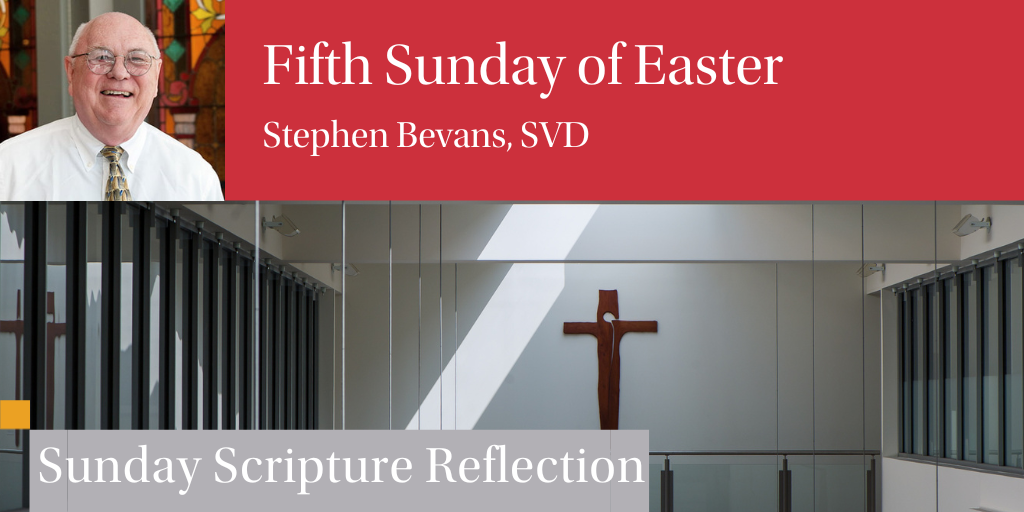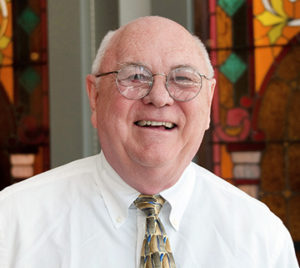

Readings:
Reading I: Acts 14:21-27
Psalm 145: 8-9, 10-11, 12-13
Reading II: Revelation 21:1-5a
Gospel: John 13:31-33a, 34-35
From August 31 to September 8 of this year, the World Council of Churches (WCC) will hold their eleventh General Assembly in the city of Karlsruhe, Germany. The theme of the Assembly is “Christ’s love moves the world to reconciliation and unity.” Now—in 2022, with Covid-19 still very much in the world, a horrible war raging in Ukraine, and daily evidence of the reality of climate change—that theme, sadly, is much more relevant than it was several years ago when it was decided upon. Ours is truly a fractured, wounded world that cries out for compassion, peace, and action.
It is in this world today that we hear the words of Jesus from his “Farewell Discourse” in the gospel of John: “I give you a new commandment: love one another. As I have loved you, so you also should love one another.” It sounds like such a cliché: “all you need is love!”; “love is all you need!” But it is true. It is only by committing ourselves to loving one another and our created world the way Jesus has loved us that there can be any hope of the new world that our second reading proclaims. The glorified Christ of Revelation calls out “Behold, I make all things new,” but he can only do that—amazingly—with our help. That is the nature of God: to be a partner, to work with us and through us to bring about God’s dream of a new world.
What does it mean to love one another the way Christ loves us? Since 2014 I have been a member of the WCC’s Commission on World Mission and Evangelism, and a few years ago a group of us on the Commission sat together to write a “study paper” on the upcoming WCC Assembly theme. The first part of that paper was a meditation on “Christ’s love,” and I’d like to share a bit of that meditation here. Our group wrote the study paper in “sense lines” to make the reading a more contemplative and reflective process:
Christ’s love is inclusive
It is for the whole of creation.
It is for all without exception.
We see this in Jesus’ table fellowship, choosing to be with the marginalized and sinners.
We see it in his encounters across gender, religious, cultural and national boundaries. …
Christ’s love is merciful and reconciling
We see this in the story of the Loving Father.
We see this in his challenge to keep on forgiving and seeking a reconciliation.
We see this in his forgiveness at his crucifixion.
Christ’s love is passionate.
We see this in his stories of the woman searching for the lost coin
And the shepherd searching for the lost sheep.
We see this in his many healings.
We see this in his many exorcisms.
Christ’s love is challenging.
He challenges his disciples and the rich young man to leave all and follow him.
He challenges Martha to let Mary learn from him.
He challenges his followers to take up their cross daily.
He challenges all who her him not to store up earthly treasures.
Christ’s love is tender.
He sees the widow in Nain and raises her son.
He has compassion on the hungry crowd in the wilderness.
He embraces lepers and gathers the children.
He hears the cry of blind Bartimaeus.
He weeps at the death of his friend Lazarus.
Christ’s love is revealed most fully on the Cross
Seen by many as foolishness,
But for us the source of hope and sign of God’s power …
Most of us will not be able to do major things to end this pan/endemic. Most of us will not be able to work out a just peace in Ukraine. Most of us will not be able to enact laws and change people’s minds to save our wounded planet. But when we live our lives in inclusivity, in mercy and reconciliation, with passion for the good of others, in response to Christ’s challenge, with Christ’s tenderness to every creature, with a willingness to give our all, perhaps the world will begin to know that we are Christ’s disciples, and that the love by which we live is his. This is our hope, this is our faith. It starts small; it starts locally; it starts with us. Maybe not dramatically, but certainly truly, Christ’s love in us will begin to move the world to reconciliation and unity, and in the end make all things new.
Louis J. Luzbetak, SVD Professor of Mission and Culture, Emeritus